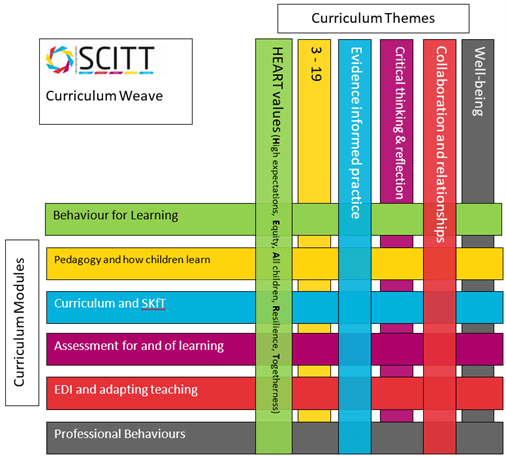Curriculum
Five Counties SCITT Mission
The Five Counties SCITT develops expert teachers and leaders of the future. The teachers we train are motivated by wanting to have a positive impact on the young people and communities that we serve. We train teachers who champion the success and life chances of all children. They create equity of opportunity, promoting inclusion, removing disadvantage, and rejecting discrimination. Our trainee teachers are often recruited from and reflect the communities we serve.
We harness our togetherness to achieve more through working collaboratively. We equip our trainees with the knowledge, skills, and practice to be able to have demonstrable impact within the local region and beyond.
Five Counties SCITT Curriculum Intent
Teaching is inherently complex. The Five Counties SCITT curriculum breaks down this complexity through the use of carefully sequenced small steps. Learning is re-visited and added to over time, supporting trainees to deepen their knowledge, understanding and practice cumulatively over the training year.
Trainees are taught through direct instruction, modelling, engaging with best current evidence, reading and critical analysis. They apply their learning in subject and phase and continuously develop through practice, feedback and reflection, guided by expert practitioners and mentors. The trainee curriculum integrates the development of knowledge and practice coherently, in line with the Core Content Framework, through different elements of the programme in school, centre and independent study. Collaborative learning in professional subject networks and phase communities provides our trainees with additional access to qualified and expert colleagues, enhancing their development of subject knowledge and pedagogy.
Throughout the curriculum there is a purposeful focus on effective teaching to support disadvantaged learners.
Five Counties SCITT trainees learn and develop so that they are ready for their next steps as Early Career Teachers, able to make a positive impact in schools in the local region and beyond. They are equipped with a firm foundation of knowledge and the building blocks of effective practice to go on to become expert teachers and to continue their career development as successful leaders.
Module design
The Five Counties SCITT curriculum integrates learning about educational theory and cognitive research with classroom-based practice and application. We have developed an interleaved and progressive approach where trainees re-visit and build on core concepts. Trainees retrieve previous learning, build on those foundational concepts and apply their knowledge in developing their classroom practice.
The taught curriculum content is organised into six modules:
- Behaviour for learning
- Pedagogy and how children learn
- Curriculum and Subject Knowledge for Teaching
- Assessment for and of learning
- EDI and adapting teaching
- Professional behaviours.
These are complemented by six core themes that permeate everything we do: CLF HEART values, 3 – 19, Evidence informed practice, Critical thinking and reflection, Collaboration and relationships, and Well-being.

*CLF SCITT is now operating as Five Counties SCITT
| CENTRE BASED LEARNING | SUBJECT STUDY | SCHOOL BASED LEARNING | PROFESSIONAL DIALOGUE | Directed and independent study | Reading and Research |
| – Building knowledge – Informed by reading and research – Modelling of practice – Learning by deconstruction, reflection, rehearsal, and practice | – Led by subject experts – Subject learning integrated – Four main strands – curriculum progression, pupil development, subject knowledge and subject pedagogy and attitudes | – Approximately 80% of training in school – Application of learning from centre based training – Linking ‘learn that’ and ‘how to’ – Mentors informed by the evidence base that underpins the curriculum | – Professional dialogue with a range of experts – Conversations support identification of strengths and areas for development – Trainees develop their ability to reflect and be pro-active – Trainees are supported to deconstruct practice | – Tasks support development of knowledge and understanding. – Tasks are self-directed or informed by other experts – Support a link between centre and school-based learning – Online opportunities can be used including subject-specific learning provided by NASBTT | – The SCITT curriculum is proudly evidence-informed. – Trainees are expected to engage with a wide range of reading to support their learning for their PGCE. |


